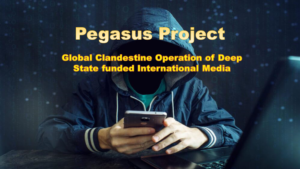
PEGASUS AND THE PREDICAMENT OF PRIVACY

Members of a civilized democratic society have a reasonable expectation of privacy, which is an essential facet of human dignity. Privacy enjoys a robust legal framework internationally as a Human Right.
Human Rights is a modern, secular version of natural rights. Being universal, fundamental, absolute, and indivisible, these rights found endorsement internationally in 1948’s Universal Declaration of Human Rights (hereinafter ‘UDHR’).
The Hobbesian Leviathan, meant to secure the life, liberty and property of individuals, more often than not, is the biggest threat to the enforcement of basic human rights for all. Therefore, after the gargantuan obliteration of Human Rights in the Second World War and the subsequent Age of Anxiety, International Law, more than ever before, aimed at the Herculean task of securing basic Human Rights for all.
The UDHR, a behemoth instrumentality of Human Rights enforcement, aims at “ensuring international recognition and protection of the essential rights of the individual.” The right to Privacy against arbitrary interference is one of the recognized rights.

Article 12 of the Universal Declaration of Human Rights (1948) states that “No one shall be subjected to arbitrary interference with his privacy, family, home or correspondence nor to attack upon his honour and reputation. Everyone has the right to protection of the law against such interference or attacks.”
Article 17 of the International Covenant of Civil and Political Rights (to which India is a party) states “No one shall be subjected to arbitrary or unlawful interference with his privacy, family, home and correspondence, nor to unlawful attacks on his honour and reputation”

Right to privacy: Judicial Evolution in India
The right to privacy is not expressly advocated as a fundamental right in the Constitution. However, it is protected as a latent and an extended part of the right to life and personal liberty guaranteed under Article 21, as a part of the freedoms guaranteed by Part III of the Indian Constitution.
The right to life and liberty enshrined in Article 21 has been liberally interpreted so as to mean something more than mere survival and mere existence or animal existence. Unlike the ‘property centric’ origin of privacy rights in England and the USA, in India, privacy rights may be traced to the ‘right to life’ enshrined under Article 12 of the Constitution. Thus, giving it a metaphysical connotation.
The right to privacy came into light in Kharak Singh v The State of U.p (1962), where the substantial question of law pertaining to the surveillance of suspects and the court equated privacy with personal freedom guaranteed in Part III of the Constitution.
In Maneka Gandhi vs. UOI (1978), the Hon’ble Supreme Court laid down the triple test for any law interfering with personal liberty:
(1) It must prescribe a procedure;
(2) the procedure must withstand the test of one or more of the fundamental rights conferred under Article 19 which may be applicable in a given situation and
(3) It must withstand the test of Article 14 (a guarantee against arbitrary State action).
In People’s Union of Civil Liberties v The Union of India (1996), the Hon’ble Supreme Court held that the security of one’s privacy against arbitrary intrusion by the police is basic to a free society.
It is, therefore, implicit in ‘the concept of ordered liberty’ and as such enforceable against the States through the Due Process Clause. It is true our Constitution does not expressly declare a right to privacy as a fundamental right, but the said right is an essential ingredient of personal liberty.
Eventually, in the Puttaswamy v. Union of India case, 2017, the Right to Privacy was declared a fundamental right by the Supreme Court. The Supreme Court has recognized that the right to privacy is as sacrosanct as human existence and is inalienable to human dignity and autonomy.
This Court held that: “Privacy is a constitutionally protected right which emerges primarily from the guarantee of life and personal liberty in Article 21 of the Constitution. Elements of privacy also arise in varying contexts from the other facets of freedom and dignity recognised and guaranteed by the fundamental rights contained in Part III.”

Government’s clandestine affair with Pegasus
Different forms of surveillance and data gathering by intelligence agencies for national security are an accepted norm all over the world.
However, it is undeniable that surveillance and the knowledge that one is under threat of being spied on can affect the way an individual decides to exercise his or her rights. Such a scenario might result in self-censorship.
This Orwellian concern was once again raised when in September 2018, Citizen Lab, a laboratory based out of the University of Toronto, Canada, released a report detailing the abuse of the zero-click-vulnerabilities, Pegasus spyware, produced by an Israeli technology firm, which according to NSO Group was sold only to certain undisclosed governments.
Further, on October 30, 2019, Whatsapp’s parent company, Meta (then called Facebook), confirmed that Pegasus was misused to target several Indian public personalities by the incumbent government. The popular critics of the government, many of whom were reputed journalists and activists are believed to have been targets of surveillance for a two-week period until May when the general elections were held in the country.

Political Uproar:
The Campaign for Judicial Accountability and Reforms (CJAR) released the following statement:
“Such large-scale intrusive surveillance into the personal phones of political leaders, journalists, activists is a flagrant violation of the right to privacy as upheld by the Hon’ble Supreme Court and an affront on the civil liberties of citizens.”
Senior journalists N Ram and Sashi Kumar approached the Supreme Court to seek an investigation into the matter. They stated that targeted surveillance is a “grossly disproportionate invasion of the right to privacy”, and therefore, does not withstand the three-fold test of reasonable restrictions on the Right to Privacy.
While The official response of the Government of India to The Washington Post stated that “The allegations regarding government surveillance on specific people have no concrete basis or truth associated with it whatsoever” and that such news reports were an attempt to “malign Indian democracy and its institutions.”
Consequently, the central government denied the request for an investigation or court-monitored enquiry into the matter. Nevertheless, the opposition took it upon itself to further the cause of a transparent and public-centric resolution of the issue. Therefore, the Chief Minister of West Bengal, Banerjee set up a two-member inquiry committee to probe Pegasus spyware.
Further, on 28 October 2021, the Apex Court agreeing that a central-based inquiry was needed, ordered an independent probe into the issue by a three-member committee. Simultaneously, the former state commission was ordered to cease functioning in December 2021.

Judicial Pronouncements on the issue:
The validity of the probable infringement of an individual’s privacy and by extension his dignity, by the government’s alleged abuse of the Pegasus cyber-intelligence tool, was challenged in the Supreme Court in Manohar Lal Sharma vs Union Of India (2021).
Wherein, the petitioners did not contend that the State should not resort to surveillance/collection of data in matters of national security, but that such misuse or likely misuse of spyware without absolute necessity is a violation of the right to privacy of citizens.
The dystopian possibility of utilizing modern technology to hear what you hear, see what you see and know what you do was the predominant civil concern, in the aforementioned case.
The three-judge Bench comprising Justices H Kohli, S Kant and N Ramana, observed that:
In Puttaswamy v. Union of India, 2017, this court held that “privacy is a constitutionally protected right which emerges primarily from the guarantee of life and personal liberty in Article 21 of the Constitution.
Further, the court considered the need to protect the privacy interests of individuals while furthering legitimate State interests. This Court, therefore, directed the State to embark upon the exercise of balancing competing interests.”
Therefore, any law which encroaches upon privacy will have to withstand the touchstone of permissible restrictions on fundamental rights.
Thus, no person can be deprived of his life or personal liberty (Article 21) except in accordance with the procedure established by law.
An invasion of life or personal liberty must meet the threefold requirement of (i) legality, which postulates the existence of law; (ii) need, defined in terms of a legitimate State aim; and (iii)proportionality which ensures a rational nexus between the objects and the means adopted to achieve them. These three requirements apply to all restraints on privacy (not just informational privacy).
The Supreme Court taking note of the Union of India’s justification for non-submission of a detailed counter affidavit, citing security concerns, re-iterated that though in matters pertaining to national security, the scope of judicial review is limited, however, this does not give the state a free pass every time the spectre of national authority is raised. (6)
As held by this Court in Ram Jethmalani v. Union of India, the Respondent- the Union of India should not take an adversarial position when the fundamental rights of citizens are at threat: “ To deny access to such information, without citing any constitutional principle or enumerated grounds of constitutional prohibition, would be to thwart the right granted by clause (1) of Article 32.”
Here, there has only been an omnibus and vague denial in the “limited affidavit” filed by the Respondent, the Union of India, which cannot be sufficient.
Further, the Supreme Court ordered the formation of a three-member committee “to enquire, investigate and determine:
i. Whether the Pegasus suite of spyware was used on phones or other devices of the citizens of India to access stored data, eavesdrop on conversations, intercept information and/or for any other purposes not explicitly stated herein?
ii. The details of the victims and/or persons affected by such a spyware attack.”
Based on the findings of this committee, a bench of Chief Justice N V Ramana and Justices Surya Kant observed that malware was found in five out of the 29 devices submitted to it. The bench also noted that the Union government “did not cooperate” with the expert committee.
The said report is kept in a sealed envelope, in the custody of the Supreme Court’s General Secretary, until required by the judges. However, the court did notably remark that the Government cannot, by merely pleading with national security, claim condonation from judicial accountability. The debate and the issue continue to be a part of the popular political discourse and legal conundrum on the government’s abuse of power to quell free speech.

Conclusion:
An English Common Law maxim asserts that “every man’s house is his castle,” However, with the advancement of technology, breach of informational privacy has become unchecked.
Within the existing legal framework, the courts have been fighting this battle of possible infringement of Fundamental Rights in the public interest.
However, in today’s environment of executive aggrandizement, the accountability of the governments in grave matters such as the likely misuse of Pegasus, (a military-grade cyber intelligence spyware), must be assured to prevent democratic backsliding of the world’s largest democracy.
The tradeoff between the right to privacy of an individual and the security interests of the State has been recognized the world over. Daniel Solove, the renowned scholar, and author of the book ‘Nothing To Hide’ hints at the incorrect framework of the debate itself. He writes “We can’t progress in the debate between privacy and security because the debate itself is flawed.”
Further, “The debate between privacy and security has been framed incorrectly, with the tradeoff between these values understood as an all or nothing proposition.” He continues, “Protecting privacy need not be fatal to security measures; it merely demands oversight and regulation.” Hence, the eventual conspectus of his book is that privacy often can be protected without undue cost to security.
Therefore, the Supreme Court of India gave the tripartite test of legality, need and proportionality for any law that mandates intrusion into the private affairs of individuals by the government. Although India’s resolve to fight such infringements becomes stronger with higher education and awareness levels.
The reluctance of the government in clarifying with evidence, allegations levelled against it, of unlawful and ostensibly arbitrary use of the Israeli Pegasus spyware, tells us how much the platitudes of anti-nationalism have been successfully employed by the government against legitimate concerns of people, to pitch citizens against each other and divide et impera.
In such a scenario, the independent Judiciary is the only hope for the citizenry. Therefore, the government must be made accountable to and supportive of such independent committees set up for probing the Pegasus spyware, so that technology does not turn into a weapon in the hands of the government.







